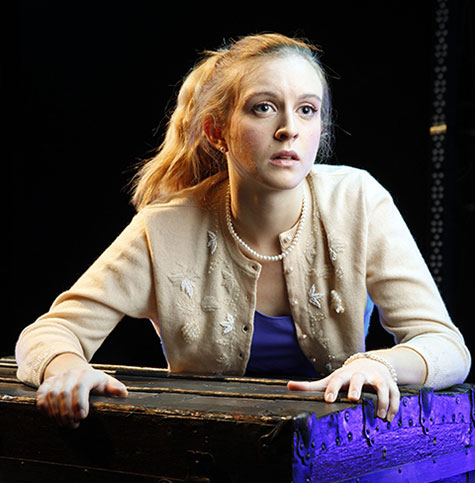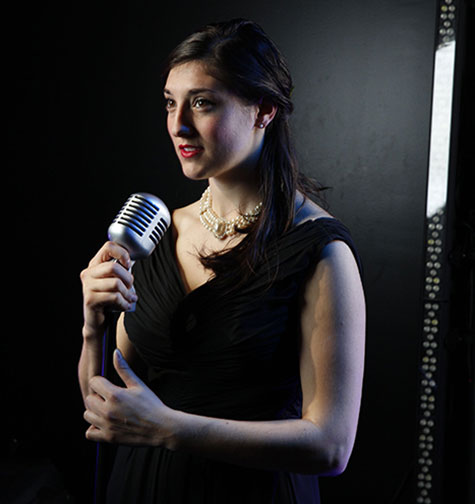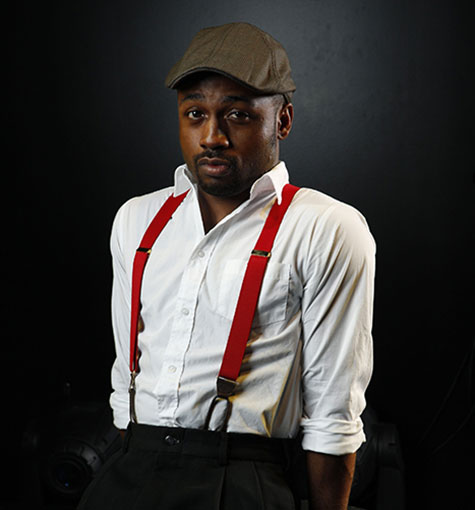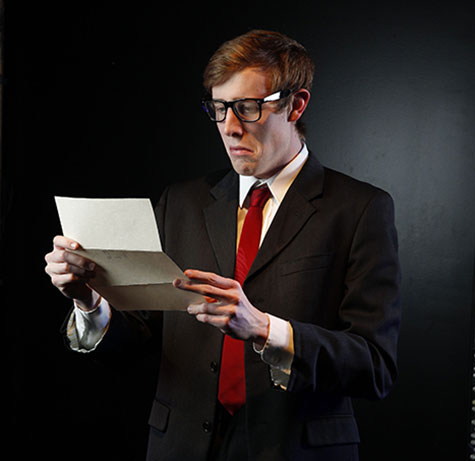
Spoken from a modern proscenium, or “picture frame,” stage, the soliloquy feels hushed and contemplative, a quiet window into private thoughts.
But William Shakespeare did not write for the proscenium. His Globe Theatre had no curtains or spotlights. Groundlings crowded at the actors’ feet, sharing the sun, elbows propped upon the platform.
“When Hamlet or Macbeth asks what he should do, it’s not a rhetorical question. He wants an answer,” said Kate Drummond, who recently defended her senior thesis on “Now I am Alone: A Study of Isolation in Soliloquies.”
This month, Drummond and the Performing Arts Department, in Arts & Sciences, will celebrate the 450th anniversary of Shakespeare’s birth with a new production of “Twelfth Night, or What You Will.” Though best known for its playful satirizing of gender roles, the beloved comedy also offers a window into Shakespeare’s development of the soliloquy form.
“Shakespeare likely wrote ‘Twelfth Night’ in the same year he wrote ‘Hamlet,’” said director Henry Schvey, professor of drama. “Viola has a number of soliloquies, but there’s also the unique phenomenon of Malvolio’s soliloquy, which is overheard, and commented upon, by other characters.”
In other words, “Shakespeare is riffing,” Schvey said. “He’s flexing his artistic muscles. He’s already questioning the convention he helped establish.”

‘Twelfth Night, or What You Will’
First performed in 1602, “Twelfth Night” centers on Viola, a shipwrecked traveler grieving for her lost twin, Sebastian. Alone in a strange country, Viola adopts male attire and a new name — “Cesario” — and enlists as a page to noble Duke Orsino, with whom she soon falls in love.
But Orsino pines for the Countess Olivia, who has sworn seven years’ chastity while mourning her own lost brother. At wits’ end, the duke dispatches Cesario to woo on his behalf and Olivia does fall in love — with Cesario, much to Viola’s chagrin.
Matters are further complicated by Sir Toby Belch, Olivia’s freebooting uncle, who has become locked in a ferocious power struggle with Malvolio, her ill-tempered steward. Yet it’s only with the arrival of an unsuspecting and very much alive Sebastian that events truly spiral out of control.
“’Twelfth Night’ is very, very funny, but it’s also bittersweet,” Schvey said. “It’s one of Shakespeare’s most satisfying comedies because it deals with fundamental and profound issues. It’s about falling in love, as all his comedies are, but also illusion, narcissism and delirium. It’s not a play you laugh at and forget.”
Drummond, who serves as assistant director, points out that Malvolio’s “box tree” soliloquy, in which he unknowingly divulges his feelings for Olivia to a group of delighted rivals, has been called “the funniest scene in Shakespeare, and it can be played that way.
“But there’s also something uncomfortable about it,” Drummond said. “Malvolio reveals his deepest desires while the audience laughs at these characters who are making fun of him.
“It’s wildly funny, but also deeply sad.”

Shared light
Schvey, who founded the PAD’s Globe summer program, notes that the intimate Hotchner Studio, which seats about 100, fosters a historically appropriate sense of give-and-take between cast and audience.
“One of the keys to working at the Globe is the concept of shared light,” Schvey said. “Plays were done during the day. Audience and actors were not divided the way they are in modern theaters.
“In the Hotchner, of course, we do use lighting effects, but there are ways to incorporate interaction between actor and audience that cannot be done in a larger space,” he added. For instance, though Schvey’s “Twelfth Night” transposes the story to 1950s Cuba, the sets remain minimal and the audience surrounds the stage on three sides.
“When an actor delivers a soliloquy, they speak directly to the audience, which is really closer to the heart of Shakespeare’s original practice,” Schvey said.
“The audience becomes a character in the play.”

Cast and crew
The cast of 19 is led by junior Kiki Milner as Viola; junior Anna Richards as Olivia; and senior Will Jacobs as Malvolio. Sophomore Ricki Pettinato and senior Louisa Kornblatt are Duke Orsino and Maria. Freshman Danny Washelesky is Sebastian.
Also featured are senior Eric Gustafson as Sir Toby Belch, sophomore Kate Needham as Sir Andrew Auguecheek and graduate student Daniel Hodges as Feste. Senior Ariel Saul is Fabian. Junior Mitchell Manar is Antonio.
Freshman Zack Schultz is the sea captain. Junior Clare Mulligan is the priest. Rounding out the ensemble are Katie Jeanneret, Jack Ritten, Cassie Roberts, Kilian Suchocki and Emma Quirk-Durben.
Scenic and costume design are by senior Quinlan Maggio and junior Maxine Wright, respectively. Henry Claude, the PAD’s music director for dance, based original compositions on 16th century melodies.
Choreography is by Christine Knoblauch-O’Neal, professor of the practice in dance. Sound and lighting are by junior David Levitt and Sean Savoie, design and technical coordinator. Props master is Emily Frei.
Assistant directors are Drummond and graduate student Jim Short. Sophomore Abby Mros is stage manager.
Tickets
Twelfth Night begins at 8 p.m. Thursday and Friday, April 17 and 18; at 2 p.m. and 8 p.m. Saturday, April 19; and at 2 p.m. Sunday, April 20. Performances take place in the A.E. Hotchner Studio Theatre, located in the Mallinckrodt Center, 6465 Forsyth Blvd.
Tickets are $15, or $10 for students, seniors and Washington University faculty and staff, and are available through the Edison Theatre Box Office.
For more information, call 314-935-6543.